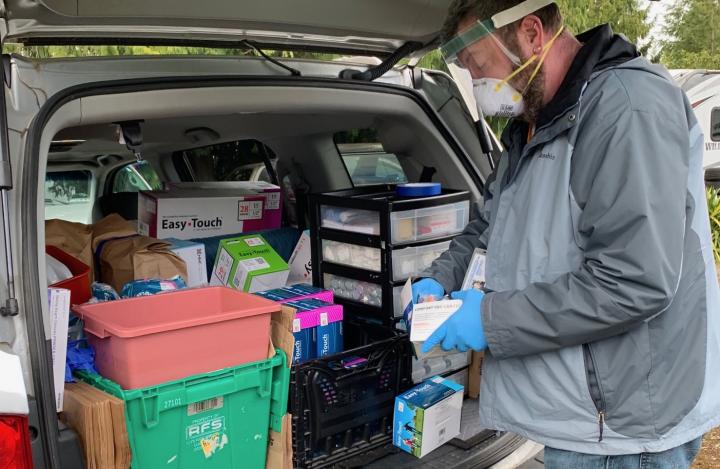Syringe programs helping during COVID-19 crisis

Credit: Photo courtesy of the Snohomish syringe services program
A new survey of people who inject illicit drugs in the state of Washington yields positive and important findings for policy makers as the world struggles to deal with the COVID-19 pandemic, said authors of the survey by the University of Washington and Public Health-Seattle & King County.
Most people – 82% ¬- who inject heroin and roughly half of methamphetamine users are interested in reducing or stopping their use and are open to a broad array of services to help them manage their substance use, according to the 2019 Syringe Exchange Health Survey led by UW’s Alcohol & Drug Abuse Institute and Public Health-Seattle & King County.
The latest results of the survey, which has been conducted every two years since 2015, also show that possession of naloxone — a drug that rapidly reverses opioid overdose — has increased substantially. Researchers found that nearly 80% of respondents in King County and outside the county who use opioids possessed a naloxone kit in 2019, compared to 2015 when only 47% in King County and 24% outside the county possessed naloxone.
“These surveys provide important insights into the complex lives of people who use drugs in our state and can be used to inform our health care, public health, social service, public policy and criminal legal system responses, particularly during and after the COVID-19 pandemic,” said study co-author Caleb Banta-Green, principal research scientist at the institute.
During the COVID-19 crisis, syringe exchanges continue to operate across Washington State, although programs have had to substantially modify how they deliver services, including distributing pre-packaged supplies, moving outdoors and providing mobile and delivery services.
Public Health-Seattle & King County is also offering screening and COVID-19 testing at the Robert Clewis Center, Downtown Public Health, Monday through Friday from 1 to 4 p.m. (one of the sites participating in the survey). At other syringe-services program locations, providers are asking COVID-19 screening questions and providing information about testing locations and other resources, public health officials said.
“People who inject drugs, and also smoke them, are at high risk for contracting and having serious consequences of COVID-19 and already use emergency health care resources at high rates,” said Banta-Green.
Consequently, access to syringe services – which distribute clean syringes and help to reduce the risk of contracting or transmitting infectious diseases – during this crisis can help alleviate pressure for emergency medical care while also helping this at-risk population get treatment to reduce or stop their drug use.
“This report confirms that the majority of persons who inject drugs are interested in reducing or stopping their drug use and improving their health,” said Dr. Jeff Duchin, Health Officer at Public Health-Seattle & King County. “The syringe exchange provides an important entry point and ongoing resources to help connect people to treatment when they are ready.”
For instance, programs such as Public Health-Seattle & King County’s Buprenorphine Pathways provides access to treatment co-located with needle exchange. The program lowers barriers to treatment safely and successfully.
Another important finding in the survey, Banta-Green pointed out, is that 68% of participants who have been diagnosed with hepatitis C remain untreated and were interested in treatment for that disease, which is good news since hepatitis C can be cured with a three-month course of medication.
“We are honored to work with our syringe-services partners across Washington state to better understand how we can best serve people who use drugs,” said Banta-Green. “It’s so important to understand that people are very interested in getting help, and that syringe exchanges provide an incredible array of life-saving services. They also provide ongoing personal relationships with members of our communities who are often in personal crisis and poor health.”
###
The new Syringe Exchange Health Survey, published April 10 on the Alcohol and Drug Abuse Institute’s website, consists of responses from 1,269 participants from most of the more than 30 fixed and mobile syringe services programs in 23 Washington counties.
Co-authors include Alison Newman, continuing education specialist, and Susan Kingston, project coordinator, UW Alcohol & Drug Abuse Institute; Sara Glick, research assistant professor, UW School of Medicine, Division of Allergy & Infectious Diseases; and Joe Tinsley, needle exchange coordinator, Public Health-Seattle & King County. This research was funded by the Washington State Health Care Authority, Division of Behavioral Health and Recovery.
For more information, contact Banta-Green at [email protected].
Media Contact
Jake Ellison
[email protected]




